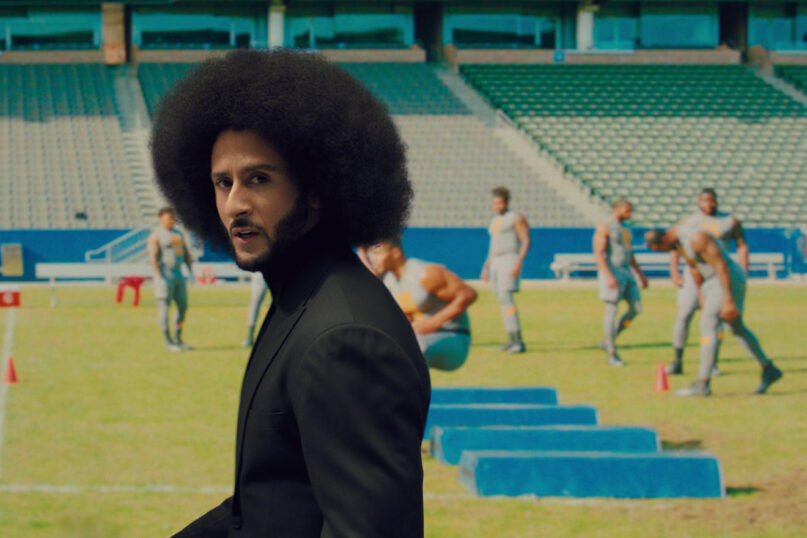(RNS) — Who knew that the simple act of kneeling could make a person both courageous and treasonous at the same time?
As “Colin in Black and White,” Netflix’s new docuseries on the life and activism of former NFL player Colin Kaepernick, demonstrates, the power of an act of protest, and the obligation to do the right thing, doesn’t come out of nowhere, but from the protester’s journey and their long-suffering community.
“Colin in Black & White” gives the backstory of a person whose decisions in life often met with disagreement, pushback and pain.
Through the vision of director Ava DuVernay, the series has a fun side: it’s a throwback to California in the late 1990s and early 2000s — think hip hop and rap livening streets, cars and homes, speaking to many listeners’ frustrations and joys more than a congregational service could.
RELATED: Families of different faiths swap houses, lives in Ava DuVernay’s ‘Home Sweet Home’
We learn about Kaepernick’s early experiences, back when his most ardent desire was to emulate the hairstyle of NBA star Allen Iverson. But in that seeking of identity in conformity we begin to understand where Colin’s willingness to conform ends and his discomfort with people around him begins. Michael Jaden, as Kaepernick, splendidly interprets this high schooler’s emotional journey, where reputation and self remain at odds with one another.
Mary Louise-Parker and Nick Offerman play Colin’s white adoptive parents as loving, pleasant, awkward and irritating at the same time. Their privilege seeps through the screen. Despite their best intentions, they avoid the truths behind heated situations, as when a police officer draws a gun on their son. For Kaepernick, dismissal, distrust and insecurity began at home.
But given Kaepernick’s upbringing, it’s a worthwhile question how his life stacks up compared to the civil rights leaders of movements past and present. He was an athletic kid who grew up in a loving, good home. He had teachers who cared, and he got a good education. Viewers might draw the conclusion that the series merely proves that anyone can achieve their dream.
What the series does best, especially through Kaepernick’s internal monologues, is reveal that none of those advantages matter much when one’s skin color dictates one’s worthiness. From high school to his NFL career, Kaepernick was only a recipient of privilege when it worked for those who had power. If he did not comply with their wishes, that favor was suddenly inaccessible.
At one point in the show, Kaepernick says, “It’s funny, you would think going out and being clearly better than your competition would be enough. But often, too often, it takes one more thing to get over that hump. Something I got as a kid: A white man’s stamp of approval.”
Faith plays a subtle yet powerful role in the show. We learn about the etymology of the word “thug” (from “thuggee,” a member of a 14th-century band of thieves and murderers who worshipped the Goddess Kali). There are undertones of Islamophobia when the Afghanistan invasion comes up in conversation.
These are reminders of the whorl of microaggressions that go on all around us and make Kaepernick’s faith in himself — to prove his potential and his ability, even in the face of discrimination — an against-the-odds victory.
For those who are thrown into a tailspin by wokeness and cancel culture, the series unravels some of these conversations. Colin’s joy and passion for football are cut short when his coaches disapprove of his hairstyle or when a hotel staffer distrusts him because of his skin color — even by his choice of a date for the homecoming dance. DuVernay shows us how these are really cases of human life not being valued and how wokeness is about maintaining the dignity and sacredness of Black life and the lives of all those communities who’ve given it their all to make a nation worth saving.
I am decidedly not an elite athlete. But I’m a Hindu and a Sikh who stands out because of my stature and my skin color. The microaggressions and fear-driven behaviors I saw in the series are similar to the ones I have experienced. “Colin in Black & White” reminded me that I need to keep working to be an accomplice to my Black colleagues and their dignity, rather than just being an ally and a bystander to their suffering.
In fact, what’s most comforting about “Colin in Black & White” is that it answers the question of why the story of this NFL quarterback matters. Does a man who gets to portray a hero every Sunday for half the year really deserve a Netflix series, not to mention a Nike commercial — for kneeling?
RELATED: Sports bring joy to our lives and are a balm to our souls. Racial justice is more important
DuVernay beautifully shows that Kaepernick, for all his fame, represents just one person among millions who have suffered racism and that their story means something. We all have a story to tell about our lives in a divisive and discriminatory culture. “Colin in Black & White” creates a space for more dialogue that allows others to share their experiences.
This includes viewers of any stripe who are committed to repairing the world; people of faith and moral conscience can’t help but be encouraged to continue confronting cultures and systems that permit hatred and violence toward others. The show drives us to continue to reform, dismantle and end systems that prevent our BIPOC siblings from thriving in this world.
It is a mutual responsibility that will allow the world some much-needed healing. We deserve nothing less.
(Tahil Sharma is regional coordinator for North America for the United Religions Initiative. The views expressed in this commentary do not necessarily reflect those of Religion News Service.)





